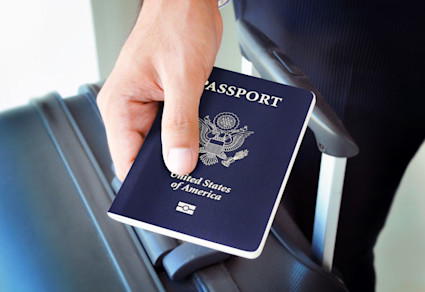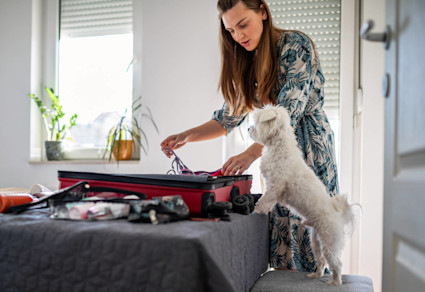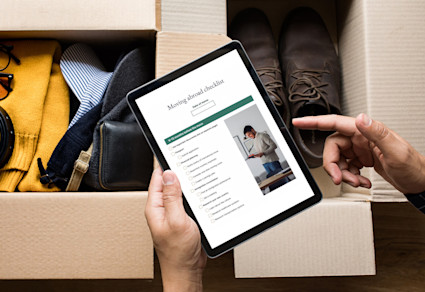1. Start planning and saving early
Moving to another country is a significant life change, and planning early is key to a smooth transition. You’ll want to consider factors such as your desired location, finances and other necessary research. Kick off your planning with the following:- Explore potential new destinations: When researching the best countries to move to, consider factors like climate, cost of living, job markets and the overall culture.
- Create a timeline: Set realistic deadlines for each step of the moving process.
- Determine your monthly expenses: When estimating your monthly expenses in your new location, consider housing, food, transportation, utilities and entertainment costs.
- Consider one-time costs: Factor in one-time costs like moving expenses, visa fees, flight tickets and anything else you’ll need for the move.
- Create a savings plan: Set aside enough money to cover your initial expenses and any potential emergencies.
2. Get or renew your passport ASAP

- Check your current passport: Ensure that it is valid for at least six months beyond the date you plan to move to another country.
- Gather required documents: Prepare copies of your birth certificate and proof of citizenship.
- Submit your application: Visit your local passport office or apply online, following the specific instructions for your country.
- Allow for processing time: Be aware of the processing time for passport applications and submit your application accordingly.
3. Connect with an immigration professional
If learning how to move to another country permanently seems overwhelming, an immigration professional can offer valuable guidance and support. They can walk you through complex immigration laws, help prepare the necessary documents for your visa application and address any potential challenges when buying a home abroad.4. Apply for your visa and permits
Obtaining the necessary visa and permits is crucial in successfully moving internationally. These documents authorize your ability to enter and stay in the country you’ll be living in. Here’s what steps to expect:- Research visa requirements: Determine your chosen country's specific visa type and application process.
- Gather required documents: Prepare copies of your passport, proof of finances and any other required documents.
- Complete the application: Fill out the visa application forms accurately.
- Submit your application: Submit your application to the relevant embassy or consulate.
- Attend the visa interview: If required, prepare for and attend your visa interview.
- Await approval: Allow for processing time and be prepared to address any additional requests or questions.
5. Contact your bank
If you plan to live overseas, you must inform your bank to ensure smooth financial transactions during and after the move. Here are the important steps to take to avoid any issues:- Update your address: Notify your bank of your new address to prevent any transaction delays.
- Review your account fees: Ask your bank about any foreign transaction fees or currency exchange rates that may be tied to your account.
- Arrange for international transfers: If you need to transfer funds from your home country to your new one, ask your bank about available options.
6. Dive into research on your future home country
Whether you want to own a home in Paris, Cabo or elsewhere, learning to move abroad isn’t solely about logistics. You’ll also want to take some time to understand your new country’s culture, customs and way of life. This will help you adapt to your surroundings and adjust to the new place you’ll call home. Here are some helpful places to start:- Learn about the culture: Explore the country’s history, traditions and social norms.
- Study the language: Consider taking classes to learn the local language, as this will help with communication and a more seamless transition.
- Research healthcare systems: Find out what healthcare options are available in your new country and how to access them.
- Research transportation options: Research the public transportation system and whether you’ll need to purchase a vehicle or make arrangements to move your current vehicle with you.
7. Find a place to call home
Finding the right place to live is a crucial step in moving overseas. Here’s what to consider when searching for your new home:- Research neighborhoods: Explore different areas in your desired country to find a location that suits your lifestyle and preferences.
- Consider transportation: Evaluate access to public transportation, schools and other essential amenities like grocery stores.
- Weigh different housing options: Determine whether you’ll be renting an apartment, buying a vacation home or purchasing a primary residence..
- Hire a real estate agent: Hire a local real estate agent for support with your search from someone who knows the area.
- Consider your needs: Think about your life stage and what amenities or characteristics of a location are most important to you. For example, the best places to live for empty nesters will be different than those with young children.
8. Decide what to do with your car(s)
One decision you may face when moving to a different country is what to do with your cars. Will you sell them or bring them with you? If you’re planning on buying a vacation home and only moving part-time, you can likely get away with keeping your car and planning on using other modes of transportation in your new country. Otherwise, consider the following when weighing your options:- Evaluate costs: If you want to keep your car, find out the cost to ship it to your new country. Take into account import duties, taxes and any necessary certifications.
- Consider regulations: Research the import regulations that apply in your new country, if any.
- Consider selling options: If you decide to sell your car, consider options like selling privately, trading in or even auctioning it.
9. Sort out healthcare options
Research the healthcare coverage you’ll need and how to secure it before relocating to another country. Consider the following:- Understand the healthcare system: Get familiar with your new country’s healthcare system, including public and private options.
- Research insurance: Explore available insurance plans and compare coverage, costs and deductibles.
- Obtain necessary records: Prepare any required medical records or documentation for your insurance application.
- Enroll in a new healthcare plan: Once you find suitable coverage, complete enrollment before you move.
10. Gather and organize important documents

- Personal identification: This includes copies of your passport, birth certificate, driver’s license and any other identification documents.
- Financial documents: Prepare copies of your bank statements, credit card statements, tax returns and investment documents—you’ll need these when applying for housing in your new country.
- Medical records: Gather copies of your medical records, immunization records and any prescriptions.
- Legal documents: Secure copies of your marriage certificate, divorce papers or any other relevant legal documents.
- Insurance documents: Gather copies of your health insurance, car insurance (if you’re bringing your car) and any other insurance documents.
- Travel documents: Secure copies of your flight tickets, visa application materials and other travel-related documents.
11. Set up your phone and internet
When moving to a new country, you will need a reliable phone and internet connection. Research your options and set up your services before or shortly after you move to avoid any service interruptions. Here’s what to do:- Purchase a local SIM card Purchase a local SIM card in your new country and activate your mobile service to keep your phone carrier and phone number.
- Set up internet service: Research internet providers in your new area and select a plan that suits your needs.
12. Prep your pets

- Check import regulations: Find out the necessary vaccinations or health certificates (sometimes called an international health certificate) needed to bring your pet abroad. Check whether your destination country requires the certificate to be endorsed by the USDA.
- Gather required documents: Be sure to have all pertinent documentation, such as health certificates, vaccination records and microchip information, with you.
- Arrange transportation: Make sure the flight you book is pet-friendly, or consider hiring a pet relocation service.
- Check quarantine requirements: Some countries, like rabies-free countries, may require a quarantine period for international pets, so check whether your new location requires this and make arrangements accordingly.
- Get pet insurance: Explore international pet insurance options to protect your pets in case of emergencies while abroad.
13. Choose how you want to move your stuff
Next, you’ll need to decide how to transport your belongings.To keep costs down, it’s helpful to downsize your items as much as possible. Then, you’ll want to compare quotes from various shipping companies. There are a few different options for the exact method of how you’ll move your stuff:- Shipping containers: This option can be cost-effective for larger shipments and tends to be the most flexible with packing and loading. However, it can come with longer transit times and may have additional fees for customs clearance.
- Air freight: Air freight offers quick transport, ideal for urgent or time-sensitive shipments. However, it’s also the most expensive option and may have weight and size restrictions.
- Hiring an international moving company: A full-service option covers all moving logistics, but can get expensive due to the specialized services needed for long-distance moving.
14. Book your flight and moving method

- Research and book your flight: Compare prices, flight times and airline preferences in advance.
- Confirm your moving method: Finalize and book your moving method.
- Coordinate logistics: Coordinate your items' pickup and delivery dates with your flight schedule.
- Get travel insurance: Purchase travel insurance in case of unexpected flight cancellations or changes.
15. Learn the local language and culture
Learning the local language and unique culture in your new home country can make for a more seamless integration. Here are a few helpful places to start:- Start learning the language: Consider taking language classes, using online resources or practicing with native speakers once you arrive.
- Plug yourself into the local culture: Attend local events, festivals and social gatherings to get a feel for the country’s customs and lifestyle.
- Join language exchange groups: In a language exchange group, you can connect with native speakers and practice your language skills in a supportive social setting.
- Explore local customs and traditions: Take the time to learn about the country’s customs and etiquette.
16. Get movin’
The last step in moving to another country is to pack your bags, say goodbye and embark on your new adventure. Prepare for the following:- Pack your luggage: Pack your essentials and remember to follow your airline’s weight and size restrictions.
- Say goodbye: Spend quality time with loved ones before you leave to say your goodbyes.
- Check-in for your flight: Arrive early to check in with plenty of time before you board.
- Arrive at your destination: Once you arrive, unpack your bags, explore your new neighborhood and make new connections.
17. Stay on track with a checklist for moving abroad
With everything to consider when moving to another country, a well-organized relocation checklist can help you stay on top of every detail and task. Use our checklist to track your moving to-dos by month, from obtaining your passport and visa to packing up your belongings.
Take your first steps with Pacaso
While learning how to move to another country may feel overwhelming, it doesn’t have to be with proper planning and preparation. Following our checklist to help keep you on track, you’ll be ready for your big move abroad! If you want to enjoy the perks of living abroad without the stress of moving to a new country full-time, consider co-owning a vacation home with Pacaso. This means less time spent preparing for a full-time move and more time spent relaxing in your destination of choice while the logistics are handled for you.How to move to another country FAQ
01: How hard is it to move to another country?
Moving to another country can be challenging, but with careful planning, it can also be a smooth experience. From visa requirements to finding a place to live, staying organized is key.
02: How far in advance should I start planning my move?
Ideally, you should start planning your move at least six months in advance. This allows time to research your destination, obtain necessary documents, arrange transportation and settle any affairs in your current home country before leaving.
03: How long does it typically take to process a visa application?
The processing time for visa applications varies depending on the country and the specific visa type. It can take anywhere from a few weeks to several months.
04: How long does it take to get my passport?
The processing time for a new passport can vary, but generally, it can take a few weeks to a few months to receive your passport.
05: How should I transport my belongings to another country?
There are a few options for shipping your belongings to another country, including shipping containers, air freight or hiring a moving company. The best option for you depends on how much you need to transport, your budget and the timeline for your move.









